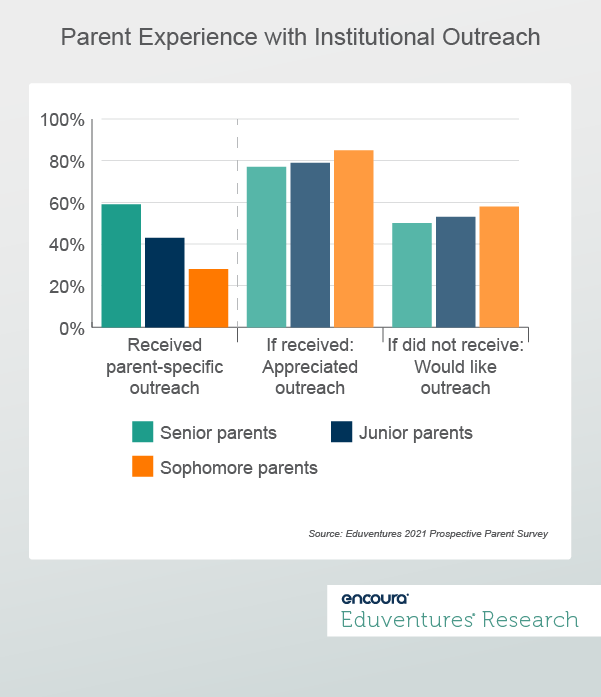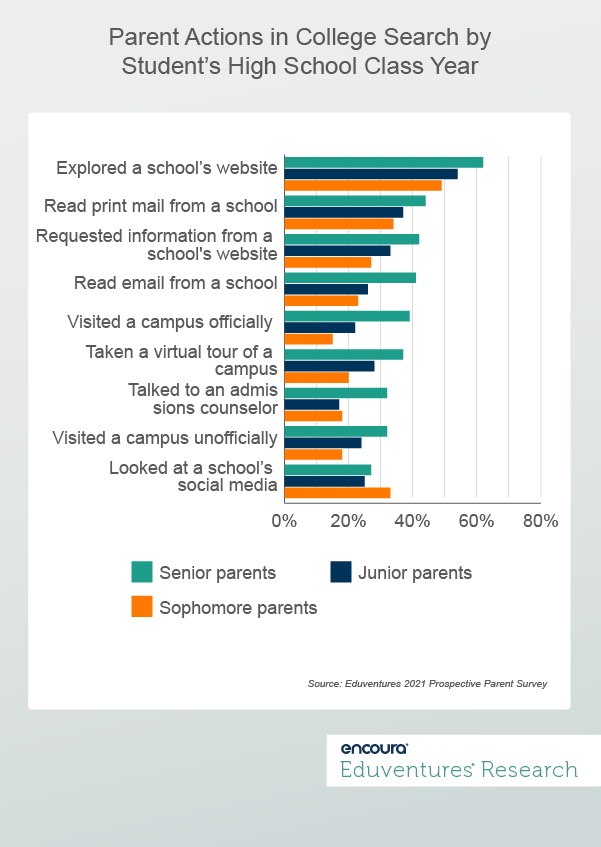We know quite a lot about prospective student communication preferences. A frequent question, however, is: but what about prospective parents? Much uncertainty exists about how – or sometimes even whether – to communicate with parents of college-bound high school students. Many institutions acknowledge the importance of including families in recruitment. Rightfully so: more than half of parents of college-bound students say they are equal partners in their children’s college search process. Still, many institutions feel they could be doing more to engage parents.
To explore the role of prospective parents in college search, we revived our Prospective Parent Survey. Here are a few highlights.
Parents and College Search
In November 2021, Eduventures asked high school parents questions about their involvement with college searches. Research topics included their level of involvement, communication preferences, financial considerations, priorities for their children’s educations, and the parent’s own experiences communicating with colleges.
Over 4,200 parents across the nation shared their thoughts. Our sample included a mix of first-generation and college-educated parents. About half already had a child who was currently enrolled or had already graduated from college, and more than two-thirds were expecting to put at least two children through college. The sample also showed diversity in racial background, age, household income, and family configuration (e.g., nuclear families, single parent households, etc.).
So, how many prospective parents have received outreach from a college targeted specifically to parents, and what were their reactions? Figure 1 below breaks out their experiences and attitudes by high school class years of their students.

Figure 1 shows that 59% of parents of high school seniors have received communication from a college specifically directed to them, but only 43% of junior parents and 28% of sophomore parents report the same. Among parents who told us a college had reached out to them, however, sophomore parents were most likely to appreciate that outreach. But appreciation of the outreach was high overall: More than three-quarters of all parents appreciated a college targeting them, specifically.
Among those who had not yet received college communication directly, at least half said they would like to, most notably parents of sophomores. Overall, only 4% of all parents said they prefer not to hear from colleges.
With this much parent interest in receiving their own college communications, how can colleges best reach them? It may be no coincidence that more senior parents report hearing from colleges than those of younger students. During senior year, students are more likely to have identified their interests in a college through an inquiry or application. It therefore becomes easy for the college to reach out to the “parent(s) of” their prospect pools.
But at this point, much of the crucial decision making that happens in families during college search is already done. In fact, more than two-thirds of parents told us they started thinking about potential application schools for their students before junior year in high school. Some institutions may be concerned about alienating parents by reaching out too early. When would parent recruitment communication cross the threshold from intrusive to welcomed?
It turns out, quite early in the process. , and another third believes the best time for colleges to start sending information is when the family thinks about where to apply. This begs the question: how can colleges get on parents’ radars earlier?
Prospective Parents Are Searching, Too
Creating a successful outreach strategy for parents requires an understanding of parent involvement in college search. How many parents go through the college search process themselves? Which actions do they take to learn more about colleges? Figure 2 sheds light on these questions.

Again, this data shows that parents of high school seniors are more active than those of younger students. But we see that nearly half of sophomore parents and more than half of junior parents have explored a school’s website. Exploring institutional websites is one of the most frequent college search activities among students, and most schools acknowledge this by designing their web experiences around their prospect audiences. But their parents are quite actively exploring the content as well.
Further, more than a third of junior and senior parents requested information about colleges on the websites. This is where prospect communication might get blurry. Most institutional websites do not have any fields on their request-for-information (RFI) forms to indicate the identity of the inquirer; they assume it must be the student. Would the subsequent recruitment outreach look different if the colleges knew they were talking with the parent rather than the student?
It probably should. Parents tell us, for example, they are particularly interested in topics around the total cost of attendance, their child’s academic experience related to their major, and health and safety.
The Bottom Line
The data shows that many prospective parents are highly engaged in their children’s college searches, even performing their own search activities. They are also quite interested in colleges communicating directly with them. It has been historically challenging to target parents of prospects who have not inquired, but our research suggests that there are some simple steps institutions can take to engage prospective parents. Some examples include:
- Creating specific parent RFIs on the institutional website. Parents do request information from colleges on their websites, but it can be very difficult for the college to distinguish whether the student or the parent inquired. To be able to send targeted outreach, institutions should consider creating parent-specific RFIs or allowing parents to identify themselves when they fill out the traditional RFI form.
- Personalize the parent campus experience. Parents, particularly those of seniors, accompany their students on campus visits. The relative popularity of virtual campus tours among parents suggests that the campus visit is about more to parents than just accompanying their children. Parent-specific topics and experiences should be considered when planning on-campus events for prospects. Some institutions already send prospective students and parents on their separate ways during official events. More schools should follow in their footsteps.
- Keep parents in mind in your emails. Recruitment emails are popular among both students and their families. Even if emails are directed solely to the student, parents likely take notice about what institutions have to say. Adding parent-specific links to these emails may give colleges an opportunity to engage with parents on topics that matter most to them and that may not be emphasized in the student emails.
Never Miss Your Wake-Up Call
Learn more about our team of expert research analysts here.
Eduventures Senior Analyst at Encoura
Contact
This recruitment cycle challenged the creativity of enrollment teams as they were forced to recreate the entire enrollment experience online. The challenge for this spring will be getting proximate to admitted students by replicating new-found practices to increase yield through the summer’s extended enrollment cycle.
By participating in the Eduventures Admitted Student Research, your office will gain actionable insights on:
- Nationwide benchmarks for yield outcomes
- Changes in the decision-making behaviors of incoming freshmen that impact recruiting
- Gaps between how your institution was perceived and your actual institution identity
- Regional and national competitive shifts in the wake of the post-COVID-19 environment
- Competitiveness of your updated financial aid model

